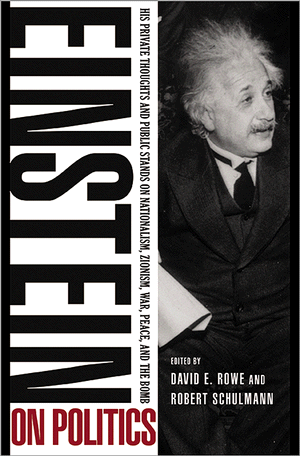What Were Einstein's Politics?
 Claims that he was an extremist had been levied against Einstein early in his career. In response to the charge in 1919 that he was “a Communist and anarchist,” he declared in an interview that “nothing is farther from my mind than anarchist ideas. I do advocate a planned economy, which cannot, however, be carried out in all workplaces. In this sense I am a socialist.” Similar wild-eyed accusations of radicalism were floated after the Second World War. Infuriated, for example, by Einstein’s call to break relations in late 1945with Spanish leader Francisco Franco, an erstwhile ally of Hitler’s Germany, Rep. John Rankin of Mississippi attacked Einstein on the floor of Congress as a “foreign-born agitator” who sought “to further the spread of Communism throughout the world.”
Claims that he was an extremist had been levied against Einstein early in his career. In response to the charge in 1919 that he was “a Communist and anarchist,” he declared in an interview that “nothing is farther from my mind than anarchist ideas. I do advocate a planned economy, which cannot, however, be carried out in all workplaces. In this sense I am a socialist.” Similar wild-eyed accusations of radicalism were floated after the Second World War. Infuriated, for example, by Einstein’s call to break relations in late 1945with Spanish leader Francisco Franco, an erstwhile ally of Hitler’s Germany, Rep. John Rankin of Mississippi attacked Einstein on the floor of Congress as a “foreign-born agitator” who sought “to further the spread of Communism throughout the world.”
Often detractors skirted the issue of outright allegiance to Moscow by asserting that Einstein was but a hapless victim. Just months before the Russian regime exploded an atomic device, Life magazine presented a powerful visual display of Einstein’s questionable loyalties by situating him prominently in a rogue’s gallery of photos. The banner title read: “Dupes and Fellow Travelers Dress up Communist Fronts.” Thus were assertions of political unreliability readily paired with claims of naïveté.
While accusations from the right are easy to dismiss, claims made by those sympathetic to Einstein’s political leanings should also be held up to scrutiny. On closer examination of the essay “Why Socialism?” published in the inaugural issue (May 1949) of Monthly Review, it becomes apparent that Einstein’s powerful indictment of “the oligarchy of private capital” serves not so much to advance socialism as an economic system per se but to advocate a planned economy as a significant instrument for achieving desirable social-ethical ends.
Central to Einstein’s acceptance of a socialist system was his expectation that “under socialism there was a greater possibility of attaining the maximum degree of individual freedom compatible with the public welfare than under any other system known to man.” Yet he was quick to point out that “socialism as such cannot be considered the solution to all social problems but merely as a framework within which such a solution is possible.” Unlike many of his contemporaries, he carefully weighed the benefits of a planned economy against the danger that an all-powerful and overweening bureaucracy might encroach upon the rights of the individual and overwhelm the classical liberal ideal of intellectual freedom.
He concluded his essay by expressing the hope that the Monthly Review would, at a time when free speech and critical thought were endangered, provide the socialist agenda with a much needed forum: “Clarity about the aims and problems of socialism is of greatest significance in our age of transition. Since, under present circumstances, free and unhindered discussion of these problems has come under a powerful taboo, I consider the foundation of this magazine to be an important public service.”
Unwavering in his attachment to the principles of universal social justice and solidarity with his fellow Jews, Einstein was, in other respects, steadfast only in his unorthodoxy and almost reckless independence. He sought a social system that rejected gross income inequality and the exploitation of the economically vulnerable, but placed equal if not more importance on the traditionalliberal goal of self-realization of the individual.
Lacking any exposure to the working-class movement in the waning decades of the German Empire, Einstein had been wary of the mass organizations of the left which sprang up or developed a new lease on life in the Weimar republic, while expressing his solidarity with some of their goals. Though he demonstrated philosophical sympathy for socialism with a human face, including many of its economic principles,he did not identify with the intellectual tradition of the European labor movement or the Marxist legacy. Instead, he placed his faith in appeals to reason by a liberal intelligentsia, which, in availing itself of the decorous and principled use of manifestos, might best guide the fortunes of Weimar Germany or the American republic. A longing for community and for a harmonious society reinforced his unease with “a political culture of problem-solving by negotiation, dispute, and majority vote” as well as with the Marxist concept of class struggle. The central issue always remained the free play afforded every individual to develop creative potential.
